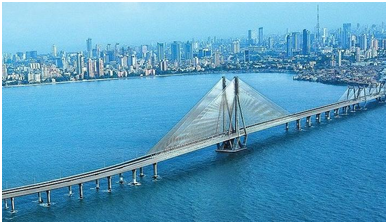by Meher Sidhwa-Pastakia
For Us All
As we move towards the 21st session of the Conference of Parties (COP 21) in Paris, there are still a few people living in denial about climate change. The good news is that increasing numbers of people are now acknowledging climate change. But the bad news is that this increase is proportional to the climate-change impacts we are facing, and nature will continue to act.
 The Bandra-Worli Sea Link is a cable-stayed bridge that connects central Mumbai with its western suburbs – Photo: Wikipedia, Ankitbhatt
The Bandra-Worli Sea Link is a cable-stayed bridge that connects central Mumbai with its western suburbs – Photo: Wikipedia, Ankitbhatt
Hi, I am Meher Sidhwa, from India, an instrumentation engineer by qualification, a backpacker and a renewable energy professional by passion, working since 2006. My vocation consists of clean energy projects under the Clean Development Mechanism (CDM), emissions’ markets, and developing methane abatement UNFCCC (United Nations Framework Convention on Climate Change) methodologies. I am currently working on solar energy projects across India, happy to see that renewable power is on its way to achieving grid parity. I am a Zoroastrian (Parsi), and our religion conveys protecting and worshipping the seven creations of God. We comprise 0.006 percent of the Indian population.
Do I Experience Climate Change?
Irrespective of whether we belong to a developed or a developing country, we are all equally prey to climate change. Personally, in my city of Mumbai, the past few years have seen erratic rainfall patterns even during winters (considering that India has four months of monsoon and not year-round rainfall). Since my city is coastal and humid, more people in the recent times are susceptible to weather-change-related flu and allergies. Also the hilly terrain surrounding Mumbai traps the polluted air, which otherwise could be swept away towards the sea. This is a concern as Mumbai is the country’s financial hub. Rapid urbanization sees no sign of stopping. The rising temperatures have made our summers extreme; so much so that in the southern part of India, a heat wave killed many people. The changes due to urbanization are clearly visible; for instance in my community I do not remember the last time we saw a sparrow around our house. I saw lots of them while I was in school, and suddenly now they seem to be gone.

There’s a reason why I am calling it ‘Highway,’ not ‘Road,’ to Paris. COP 21 is the most significant among the recent COPs that we’ve seen in recent years. For the first time we have political intervention. This is an opportunity for the world to agree on a global climate agreement to prevent the two-degree Celsius rise in global temperature. Numerous countries have submitted their INDCs (Intended Nationally Determined Contributions); apart from the INDCs there are prospects of a global agreement on climate neutrality to prevent the two-degree rise. Also, the two fundamental principles of the proposed agreement are: ‘non-backsliding,’ so that countries cannot withdraw or make commitments lesser than the previous one; and ‘scale-up,’ whereby every next contribution increases in ambition.
We are now at a point where we cannot undo the industrial revolution of the 1800s, but with technological innovations we sure can achieve development using alternate energy. It is fair to believe that the upcoming COP has the potential to sign a universal legally binding agreement with varied levels of adaptation and mitigation contributions for each nation. As we speculate ahead of time, I choose to remain optimistic and look forward to a global climate-change agreement. The legendary Charlie Chaplin once said, “You’ll never find a rainbow if you’re looking down!”
Meher Sidhwa-Pastakia is one of the four-member young-adult cohort that will represent Religions for Peace-USA at the upcoming climate change negotiations (COP 21) in Paris this December.
